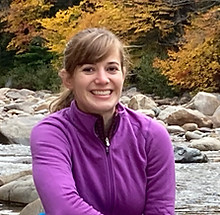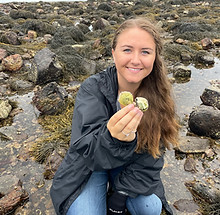
Meet the Team


Lab Alumni

Todd Stelling (he/him)
Todd Stelling was born in NH, but spent his whole childhood in the mountains of Jim Thorpe, PA. He returned to New England to get his BS in Environmental Science ( and a minor in History) from Endicott College in Beverly, MA. His undergraduate thesis compared the biofouling community compositions of Beverly Harbor and Gloucester Harbor and what role invasive species played. His master’s research focuses on the behavioral effects of ocean acidification on juvenile American lobsters. As conditions within the GOM change, understanding the effects of OA on foraging behavior and predator-prey interactions of this crucial life stage of American lobsters will provide valuable insight into the fate of this iconic species.

Peyton Lockett (he/him)
Peyton Lockett is a sophomore at the Jackson State University who is pursuing a major in Marine Science and a minor in Vocal Performance. Peyton has a background in biology and music. Peyton has currently began to work in the lab with his professor during his freshman year back at the Jackson State University along with experience vocally by having multiple live musical performances within and outside of the institution. He has a passion for helping others, gaining more knowledge about his profession, and music (specifically R&B). He plans on attending graduate school to receive his Master’s degree once he has graduated from Jackson State University. He is a native of Red Banks, Mississippi who enjoys time outside, trying different foods, and listening to music. His interest in one particular species is yet to be decided because he is ecstatic in researching a wide variety of marine species, primarily in the deep sea.

Julia Burton (she/her)
Julia Bolton is a Minorities in Aquaculture (https://www.mianpo.org/) intern at the QMEL and MEL labs of UNH this summer. She graduated from the University of Vermont in 2023 with an Environmental Science B.S.. However, her interests aren’t completely terrestrial. Instead, her interests lie in marine work like aquaculture, seaweed, and climate change resiliency for coastal communities.
This summer she supported various experiments with a focus on oyster gaping behavior under stressors, like heat and predation. In addition, she worked on making a farm deployment possible for the offshore, wireless biosensor called the clam phone. This research opportunity was an amazing way for her to experience a research-focused environment before she starts her graduate program at Sophia University in Tokyo. At Sophia University, she will be studying Global Environmental Studies to focus on marine conservation and policy.
Other than research, Julia loves working and having fun outside, especially in community with others! Her recent obsession has been mountain unicycling, and her next outdoor recreation goal is to learn how to fish!

Dr. Kaitlin Van Volkom (she/her)
Kaitlin Van Volkom is a Ph.D. student who originally hails from southern California. She studies community wide interactions within benthic communities in the Gulf of Maine, focusing on the role that slipper limpets play in their community, and how this may change with warming temperatures. She has surveyed populations of limpets from northern Maine to Rhode Island to get an idea of their distribution and population density. Additionally, she is studying predator prey dynamics between crustaceans and slipper limpets, as the slipper limpet’s role as a prey item has not been investigated within its native range. Subsequently, she will look at differences in shell morphology between different populations, and how shell shapes affect physiological processes. She is hoping that this research will help determine how a native species is being impacted within a rapidly warming system.
Prior to starting her Ph.D. she completed a master’s in biology at UNH, evaluating the quality of invasive ascidian species as a prey item for a native sea star. Currently, Kaitlin serves on the Department’s Graduate Student Committee, helping to advocate for graduate student needs. Outside of school, she enjoys rock climbing and spending time outdoors in New England.

Kyrie Newby (she/her)
Kyrie Newby is from Lafayette, Colorado, and is a master's student in marine biology studying blue mussel physiology in the context of a changing Gulf of Maine. The area is simultaneously experiencing many different types of changes, all of which are important to understand for the future of shellfish populations and aquaculture in New England. She is currently working on a project focusing on mussel settlement in the presence of different levels of noise in Portsmouth Harbor, NH. She graduated from Colorado College in 2021 and majored in both Organismal Biology & Ecology and Music Performance, focusing on both the scientific and cultural aspects of environmental sound. Prior to marine biology, she worked in ornithology in the northern Great Plains and artic meteorology with NOAA. Her favorite activities outside of research include tidepooling anywhere and everywhere, identification of whatever living thing she can get her hands on, creating environmental music art, and playing with her cat Momo.

Michaela Edwards (she/her)
Michaela Edwards is a marine biology student studying interspecific interactions with an emphasis on behavioral responses and invasive species. Michaela’s broader focus is on coastal species, particularly those located along New England’s coast. For her master’s program, she focuses on Eastern oysters (Crassostrea virginica) behavioral responses to various interactions with invasive European green crabs (Carcinus maenas).
Michaela attended the University of New Hampshire for her undergraduate degree. She graduated from UNH with a B.S. in Marine, Estuarine, and Freshwater Biology. In her undergraduate degree, Michaela joined Dr. Brittany Jellison’s lab as an intern in her Junior year. When she first joined the Jellison lab, Michaela looked at morphological features of blue mussels that were subjects in a previous study looking at warming, ocean acidification, and predatory factors influencing the blue mussels. This internship blossomed many interests for her—specifically morphological alterations under different conditions and interspecific interactions with a narrower focus on predator-prey relationships.
During Michaela’s free time, she loves hiking with her dogs and being around the water, tide-pooling, or snorkeling.
![me[64].jpg](https://static.wixstatic.com/media/1f4c1f_4a5dcea877da408d9bcd2662215530bb~mv2.jpg/v1/crop/x_0,y_158,w_2075,h_2028/fill/w_220,h_215,al_c,q_80,usm_0.66_1.00_0.01,enc_avif,quality_auto/me%5B64%5D.jpg)
Johnny Lamond (he/him)
Johnny’s research interests are focused on climate change and ecology. He is graduating from the University of New Hampshire where he studied Environmental Conservation and Sustainability. During his time at UNH, he has assisted Dr. James Haney and Dr. Amanda McQuaid in researching what physical factors affect the aerosolization of cyanobacteria in freshwater ecosystems. Additionally, he presented this research at the Undergraduate Research Conference. His interest in marine biology was sparked from growing up in his hometown of Rockport, MA, surrounded and living by the ocean. Johnny has always had an affinity for marine life and ecosystems. He is currently working at the UNH Coastal Marine Lab studying the effects of ocean acidification on juvenile American Lobsters. He intends to finish his degree and further pursue his education in marine biology. Johnny is excited to continue working with Dr. Brittany Jellison and Todd Stelling while learning more about ecology and further building his lab skills.

Lillian Benoit (she/her)
Lillian is a senior at the University of New Hampshire majoring in Marine, Freshwater, and Estuarine Biology. Her main areas of interest are marine ecology and evolutionary ecology. She is currently assisting with research regarding oxidative stress in oysters and is excited to continue developing and learning new lab techniques.
Outside of school, Lillian enjoys hiking, tide pooling, and collecting certifications/licenses. She recently got her NH boating license and is going to work on getting a PADI certification next!


_JPG.jpg)








